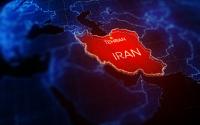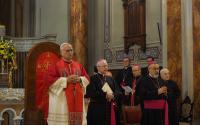19 January 2005Guardian
British prime ministers are often defenestrated but never inaugurated. After a nod from the Queen, a newly elected leader simply turns up in Downing Street as his predecessor scrambles out the back door.
Republican France handles matters more regally. Once confirmed by the constitutional court, a new president assumes office at a solemn Elysée Palace ceremony to which the voters are not invited.
Most countries favour some sort of special "do" to install a new leader. But things do not always go to plan.
Hamid Karzai's inauguration as Afghan president last month was all but eclipsed by the presence of two grim-faced warlords, the US vice-president, Dick Cheney, and the defence secretary, Donald Rumsfeld. Mahmoud Abbas was inaugurated last Saturday as Palestinian president, even though he does not yet have a state to preside over. The accompanying gunfire was not part of the celebrations.
George Bush's inauguration as US president tomorrow is an altogether different matter - a thoroughly imperial event, scripted down to the last detail.
Ignoring the fact that Mr Bush is president already, Republicans are planning a $40m (£21m) celebration they say will be bipartisan. In truth it resembles an election victory party. To deflect criticism, the four-day extravaganza has been dedicated to US soldiers abroad and entitled Celebrating Freedom and Honouring Service.
Democratic party poopers have complained that the largely corporate-funded shenanigans are excessive and tasteless. But moderation is a casualty of the modern age.
James Madison, inaugurated in 1809, only had one ball. Mr Bush has nine balls, plus three gala dinners and several concerts. The Black Tie & Boots Ball, organised by Texans, is the most sought-after, with $125 tickets touted at $1,000 each.
George Washington had no balls at all. He was rowed across the harbour to his inauguration in New York in 1789. "My station is new; and, if I may use the expression, I walk on untrodden ground," he said later.
When his turn came, Thomas Jefferson rode into town from Virginia and hitched his horse outside the White House. Theodore Roosevelt, a born showman, invited the Apache chief, Geronimo, to his 1905 bash.
Jimmy Carter, whose 1977 inauguration was a snip at $3.5m, also tried the common touch. He abandoned his limousine and walked up Pennsylvania Avenue. His message was that he was just an ordinary guy. Four years later, voters agreed and replaced him with an ex-film star. Ronald Reagan's first presidential knees-up cost $19m. Inauguration inflation, financial and conceptual, has since proved unstoppable.
Given Mr Bush's claim to be a wartime president encircled by evil doers, his planned walkabout may be a brief affair. He will ride in the latest Cadillac - useful advertising for corporate sponsor General Motors.
Security precautions are almost febrile. They include anti-aircraft guns, Iraq army surplus WMD detection equipment, "canine bomb sniffing units", and about 9,000 soldiers, police, and secret service agents - Mr Bush's praetorian guard.
A global television audience will watch Mr Bush's reinstallation as the world's most powerful man - a process recalling the circuses and triumphal processions up the original Capitol Hill of Rome's all-conquering emperors. Imperial parallels are inescapable. For Mr Bush will preside over the world's only superpower, an empire in all but name whose military bases girdle the globe.
Even the word "inauguration" comes from the Latin verb inaugurare, meaning "to take omens or auguries from the flight of birds". Mr Bush's speech will be tracked by hawks and doves around the world.
Edmund Burke noted, "a great empire and little minds go ill together". Mr Bush in his second term will be expected to think big and act wisely; and to avoid the fate of his ill-omened predecessor William Henry Harrison.
Despite a cold, Harrison insisted on delivering his 1841 inaugural address in a snowstorm. He caught pneumonia and died within a month - the shortest presidency in history.






